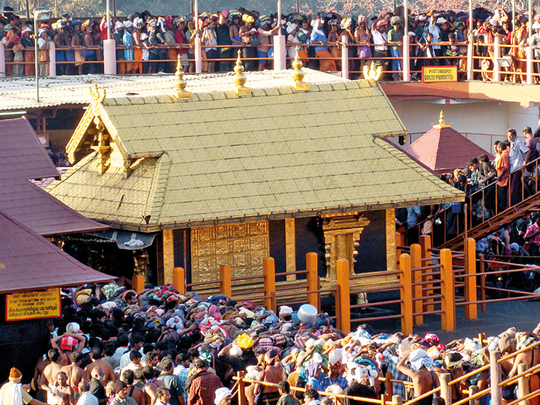
Thiruvananthapuram: When a nation’s highest court rules in favour of gender equality, it should in normal circumstances be welcomed and considered a step towards modernism and social renaissance.
More so, in a state like Kerala which boasts of one hundred per cent literacy and a high level of women’s empowerment.
But the fallout of India’s Supreme Court verdict that gave permission for women to enter the Sabarimala Ayyappa temple has taken most people by surprise: Large numbers of tradition-bound Hindus have taken to the streets — a significant number of them women — protesting against the permission granted to women for temple entry.
The situation may look bizarre for an outside observer, but faith, tradition, convention and patriarchy are all intertwined in India’s national fabric with such complexity that a court-intervened consent that goes against the grain of belief need not be appreciated.
The Sabarimala Ayyappa temple has been a male preserve for decades, and ongoing protests across the state against the court ruling gives the impression that the large majority of Hindus do not feel the temple’s bachelor-deity Ayyappa would be pleased with the presence of young women in the temple.
For decades, girls and women between the ages of 10 and 50 have been barred from entering the temple on the belief that the deity is an ‘eternal bachelor’.
While those like P.T. Usha recently visited the temple after waiting all these years to meet the age requirement for entry, others like writer P. Geetha feel that women are being denied their right to visit the temple.
However, the majority seems opposed to the court verdict and the resentment is palpable among traditionalists, both women and men.
Says Chandralekha C, a teacher based in Thiruvananthapuram: “Why should anyone have the urge to break a tradition of so many decades? In addition, the hilly Sabarimala terrain is tough for women to navigate. There are so many other Ayyappa temples, so why should any woman insist on going to this particular temple where women’s entry is barred?”
Agrees Radhakrishna Pillai S, a businessman based in Kottayam district: “Not permitting entry for women is a long-standing custom at the Sabarimala temple and it is a good custom. The question is whether there is any need to change it. Also, according to Hindu faith, the deity also has rights, and in that sense it would a violation of the deity’s rights to have decisions taken by a court that go counter to the established customs,” he said.
Pillai adds that women were not permitted at the temple even during British times, adding that the intensity of the resentment against the verdict is clear from the decision of many upper middle class women to join the street protests.
The most prevalent feeling seems to be about protecting custom. Says Devi Priya, a writer based in Thiruvananthapuram: “Women do have rights, but customs should be protected, too. After all, girls below 10 years and women over 50 years are allowed entry at the temple. So why should one insist on going during the 10-50 age duration? Not just at Sabarimala or in Hinduism, in all religions, customs must be protected”.
With emotions running so strong against a tradition being overturned by a court verdict, the Kerala government has a steep challenge on its hand as the countdown begins to the pilgrimage season that opens in mid-November.












